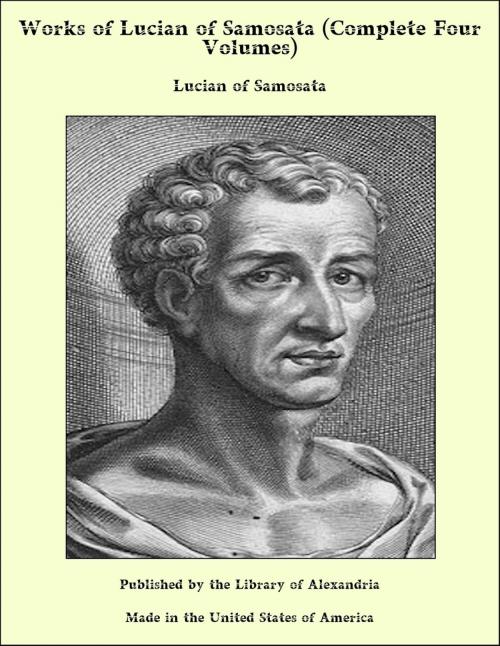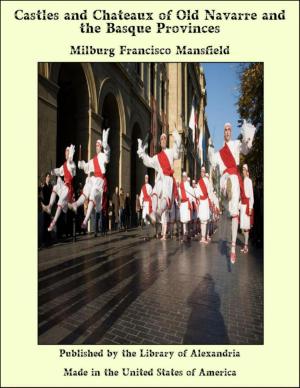Works of Lucian of Samosata (Complete Four Volumes)
Nonfiction, Religion & Spirituality, New Age, History, Fiction & Literature| Author: | Lucian of Samosata | ISBN: | 9781465574718 |
| Publisher: | Library of Alexandria | Publication: | March 8, 2015 |
| Imprint: | Language: | English |
| Author: | Lucian of Samosata |
| ISBN: | 9781465574718 |
| Publisher: | Library of Alexandria |
| Publication: | March 8, 2015 |
| Imprint: | |
| Language: | English |
It is not to be understood that all statements here made are either ascertained facts or universally admitted conjectures. The introduction is intended merely to put those who are not scholars, and probably have not books of reference at hand, in a position to approach the translation at as little disadvantage as may be. Accordingly, we give the account that commends itself to us, without discussion or reference to authorities. Those who would like a more complete idea of Lucian should read Croiset's Essai sur la vie et les oeuvres de Lucien, on which the first two sections of this introduction are very largely based. The only objections to the book (if they are objections) are that it is in French, and of 400 octavo pages. It is eminently readable. With the exception of a very small number of statements, of which the truth is by no means certain, all that we know of Lucian is derived from his own writings. And any reader who prefers to have his facts at first rather than at second hand can consequently get them by reading certain of his pieces, and making the natural deductions from them. Those that contain biographical matter are, in the order corresponding to the periods of his life on which they throw light, The Vision, Demosthenes, Nigrinus, The Portrait-study and Defence (in which Lucian is Lycinus), The Way to write History, The double ndictment (in which he is The Syrian), The Fisher (Parrhesiades), Swans and Amber, Alexander, Hermotimus_ (Lycinus), Menippus and Icaromenippus (in which Menippus represents him), A literary Prometheus, Herodotus, Zeuxis, Harmonides, The Scythian, The Death of Peregrine, The Book-fancier, Demonax, The Rhetorician's Vade mecum, Dionysus, Heracles, A Slip of the Tongue, Apology for 'The dependent Scholar.'_ Of these The Vision is a direct piece of autobiography; there is intentional but veiled autobiography in several of the other pieces; in others again conclusions can be drawn from comparison of his statements with facts known from external sources. Lucian lived from about 125 to about 200 A.D., under the Roman Emperors Antoninus Pius, M. Aurelius and Lucius Verus, Commodus, and perhaps Pertinax. He was a Syrian, born at Samosata on the Euphrates, of parents to whom it was of importance that he should earn his living without spending much time or money on education. His maternal uncle being a statuary, he was apprenticed to him, having shown an aptitude for modelling in the wax that he surreptitiously scraped from his school writing-tablets. The apprenticeship lasted one day. It is clear that he was impulsive all through life; and when his uncle corrected him with a stick for breaking a piece of marble, he ran off home, disposed already to think he had had enough of statuary. His mother took his part, and he made up his mind by the aid of a vision that came to him the same night.
It is not to be understood that all statements here made are either ascertained facts or universally admitted conjectures. The introduction is intended merely to put those who are not scholars, and probably have not books of reference at hand, in a position to approach the translation at as little disadvantage as may be. Accordingly, we give the account that commends itself to us, without discussion or reference to authorities. Those who would like a more complete idea of Lucian should read Croiset's Essai sur la vie et les oeuvres de Lucien, on which the first two sections of this introduction are very largely based. The only objections to the book (if they are objections) are that it is in French, and of 400 octavo pages. It is eminently readable. With the exception of a very small number of statements, of which the truth is by no means certain, all that we know of Lucian is derived from his own writings. And any reader who prefers to have his facts at first rather than at second hand can consequently get them by reading certain of his pieces, and making the natural deductions from them. Those that contain biographical matter are, in the order corresponding to the periods of his life on which they throw light, The Vision, Demosthenes, Nigrinus, The Portrait-study and Defence (in which Lucian is Lycinus), The Way to write History, The double ndictment (in which he is The Syrian), The Fisher (Parrhesiades), Swans and Amber, Alexander, Hermotimus_ (Lycinus), Menippus and Icaromenippus (in which Menippus represents him), A literary Prometheus, Herodotus, Zeuxis, Harmonides, The Scythian, The Death of Peregrine, The Book-fancier, Demonax, The Rhetorician's Vade mecum, Dionysus, Heracles, A Slip of the Tongue, Apology for 'The dependent Scholar.'_ Of these The Vision is a direct piece of autobiography; there is intentional but veiled autobiography in several of the other pieces; in others again conclusions can be drawn from comparison of his statements with facts known from external sources. Lucian lived from about 125 to about 200 A.D., under the Roman Emperors Antoninus Pius, M. Aurelius and Lucius Verus, Commodus, and perhaps Pertinax. He was a Syrian, born at Samosata on the Euphrates, of parents to whom it was of importance that he should earn his living without spending much time or money on education. His maternal uncle being a statuary, he was apprenticed to him, having shown an aptitude for modelling in the wax that he surreptitiously scraped from his school writing-tablets. The apprenticeship lasted one day. It is clear that he was impulsive all through life; and when his uncle corrected him with a stick for breaking a piece of marble, he ran off home, disposed already to think he had had enough of statuary. His mother took his part, and he made up his mind by the aid of a vision that came to him the same night.















